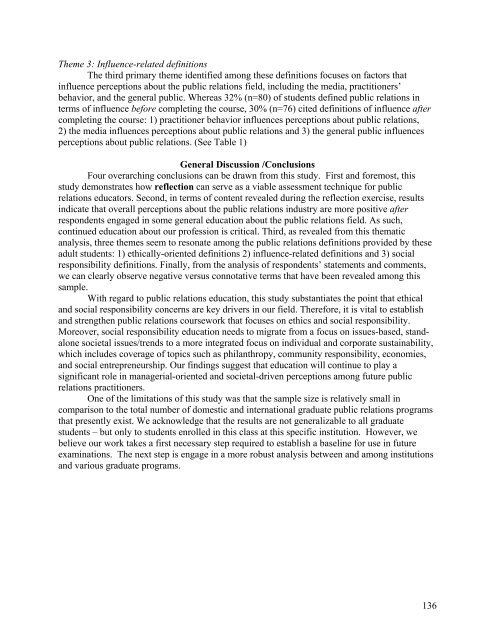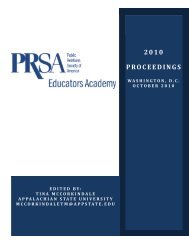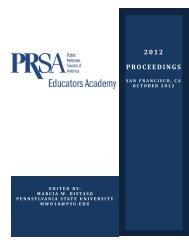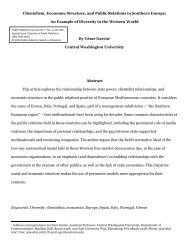2008 PROCEEDINGS - Public Relations Society of America
2008 PROCEEDINGS - Public Relations Society of America
2008 PROCEEDINGS - Public Relations Society of America
You also want an ePaper? Increase the reach of your titles
YUMPU automatically turns print PDFs into web optimized ePapers that Google loves.
Theme 3: Influence-related definitions<br />
The third primary theme identified among these definitions focuses on factors that<br />
influence perceptions about the public relations field, including the media, practitioners’<br />
behavior, and the general public. Whereas 32% (n=80) <strong>of</strong> students defined public relations in<br />
terms <strong>of</strong> influence before completing the course, 30% (n=76) cited definitions <strong>of</strong> influence after<br />
completing the course: 1) practitioner behavior influences perceptions about public relations,<br />
2) the media influences perceptions about public relations and 3) the general public influences<br />
perceptions about public relations. (See Table 1)<br />
General Discussion /Conclusions<br />
Four overarching conclusions can be drawn from this study. First and foremost, this<br />
study demonstrates how reflection can serve as a viable assessment technique for public<br />
relations educators. Second, in terms <strong>of</strong> content revealed during the reflection exercise, results<br />
indicate that overall perceptions about the public relations industry are more positive after<br />
respondents engaged in some general education about the public relations field. As such,<br />
continued education about our pr<strong>of</strong>ession is critical. Third, as revealed from this thematic<br />
analysis, three themes seem to resonate among the public relations definitions provided by these<br />
adult students: 1) ethically-oriented definitions 2) influence-related definitions and 3) social<br />
responsibility definitions. Finally, from the analysis <strong>of</strong> respondents’ statements and comments,<br />
we can clearly observe negative versus connotative terms that have been revealed among this<br />
sample.<br />
With regard to public relations education, this study substantiates the point that ethical<br />
and social responsibility concerns are key drivers in our field. Therefore, it is vital to establish<br />
and strengthen public relations coursework that focuses on ethics and social responsibility.<br />
Moreover, social responsibility education needs to migrate from a focus on issues-based, standalone<br />
societal issues/trends to a more integrated focus on individual and corporate sustainability,<br />
which includes coverage <strong>of</strong> topics such as philanthropy, community responsibility, economies,<br />
and social entrepreneurship. Our findings suggest that education will continue to play a<br />
significant role in managerial-oriented and societal-driven perceptions among future public<br />
relations practitioners.<br />
One <strong>of</strong> the limitations <strong>of</strong> this study was that the sample size is relatively small in<br />
comparison to the total number <strong>of</strong> domestic and international graduate public relations programs<br />
that presently exist. We acknowledge that the results are not generalizable to all graduate<br />
students – but only to students enrolled in this class at this specific institution. However, we<br />
believe our work takes a first necessary step required to establish a baseline for use in future<br />
examinations. The next step is engage in a more robust analysis between and among institutions<br />
and various graduate programs.<br />
136
















